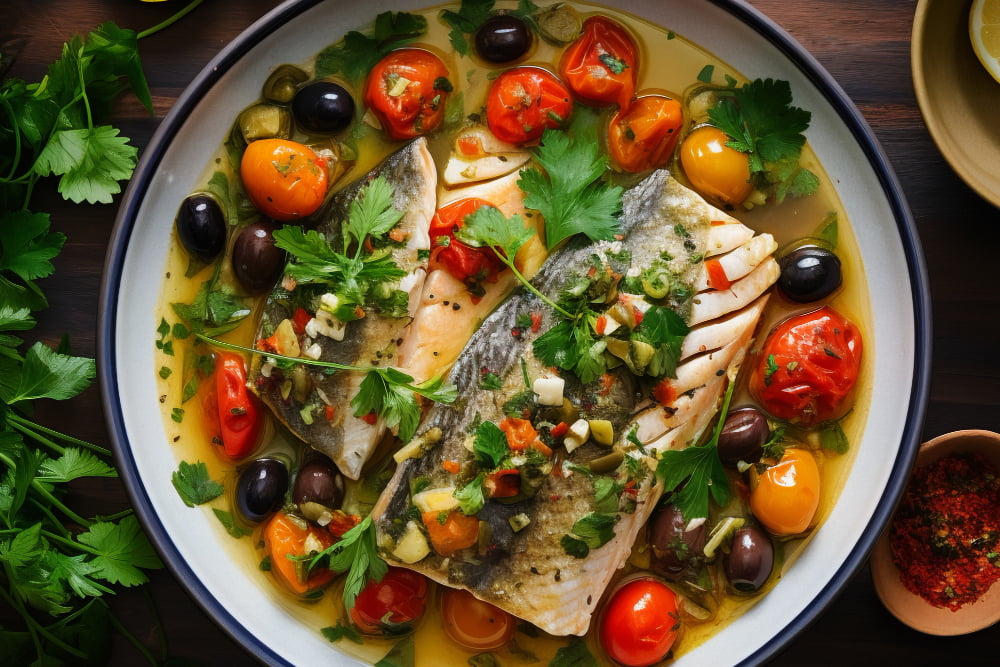The pescatarian diet, an amalgamation of the bounty of the sea and the richness of plant-based fare, is increasingly recognized for its myriad health benefits. This dietary approach, which integrates the nutritive power of seafood with the wholesomeness of a vegetarian diet, is more than just a culinary preference; it’s a lifestyle choice fostering robust health. We will embark on an exploratory journey, delving into the myriad benefits this diet holds for physical health, mental well-being, and environmental sustainability.
Defining the Pescatarian Diet
At its essence, the pescatarian diet is a symphony of seafood and vegetarian fare. It predominantly includes fish, shellfish, and a vast array of plant-based foods such as fruits, vegetables, grains, nuts, and legumes. This diet is flexible, allowing for the inclusion of dairy and eggs, and caters to various nutritional requirements and ethical beliefs. Its adaptability makes it an appealing choice for many seeking a balanced and health-conscious diet.
Nutritional Benefits
The pescatarian diet is a powerhouse of nutrition. It is replete with omega-3 fatty acids, particularly from fatty fish like salmon, mackerel, and sardines, which are crucial for heart health, reducing inflammation, and supporting brain function. This diet also provides high-quality protein from both seafood and plant sources, vital for muscle repair and growth. Additionally, it offers a rich array of vitamins (including B12, D, and A) and minerals (such as iron, zinc, and selenium), many of which are less prevalent in a purely plant-based diet. This combination ensures a balanced intake of essential nutrients, promoting overall health.

Heart Health Advantages
One of the most significant advantages of the pescatarian diet is its positive impact on heart health. Regular consumption of fish has been linked to reduced risks of heart diseases, attributed to the omega-3 fatty acids’ role in regulating blood lipids. These fatty acids help in lowering bad cholesterol (LDL) and increasing good cholesterol (HDL), thereby reducing the risk of plaque buildup in arteries. Furthermore, the diet’s high fiber content from plant-based foods contributes to better blood pressure control, fortifying heart health.
Weight Management and Metabolism
The pescatarian diet excels in aiding weight management. Its nutrient-rich, low-calorie profile promotes a feeling of fullness, thus reducing the likelihood of overeating. The high protein content boosts metabolism, which aids in more efficient calorie burning and weight loss. This diet also tends to have lower levels of unhealthy fats compared to meat-based diets, making it an excellent choice for maintaining a healthy weight.
Mental Health and Cognitive Function
The pescatarian diet’s benefits extend to mental health and cognitive function. Omega-3 fatty acids are known for their role in brain health, potentially improving memory and cognitive abilities. They also have mood-stabilizing properties, which can be beneficial in managing conditions like depression and anxiety. The varied nutrient profile of this diet, rich in antioxidants and vitamins, further supports brain health, making it a conducive choice for cognitive longevity.

Environmental Perspective
From an environmental standpoint, the pescatarian diet is a more sustainable and ecologically responsible choice compared to meat-centric diets. Fish and seafood, especially when sourced sustainably, have a lower environmental impact in terms of greenhouse gas emissions, land use, and water use. This diet encourages a shift towards more sustainable eating habits, playing a vital role in reducing the ecological footprint.
Skin and Aging
The pescatarian diet is also beneficial for skin health. The omega-3 fatty acids help in maintaining skin hydration, reducing inflammation, and protecting against UV radiation. The antioxidants and vitamins in fruits and vegetables combat oxidative stress, which is a key factor in skin aging. This nutrient synergy contributes to healthier, more youthful-looking skin.
Risks and Considerations
While the pescatarian diet is predominantly beneficial, it’s important to consider potential risks. One key concern is the intake of mercury and other toxins, which can be found in certain fish species. It’s crucial to choose low-mercury fish and consume a variety of seafood to minimize these risks. Additionally, individuals on this diet should be mindful of getting enough iron, zinc, and vitamin B12, which are more readily available in meat and may require careful planning to obtain from a pescatarian diet.

Incorporating the Diet into Lifestyle
Transitioning to a pescatarian diet can be an exciting and flavorful journey. It involves discovering new seafood recipes, experimenting with different types of fish and shellfish, and combining them with a variety of plant-based foods. Meal planning is key to ensuring a balanced intake of nutrients. This diet also offers a great opportunity to explore different cuisines and cooking techniques, making it an enjoyable and health-promoting lifestyle change.
Pescatarian Diet and Physical Performance
The pescatarian diet is particularly beneficial for physical performance and muscle building. The high-quality protein from seafood aids in muscle repair and growth, while the carbohydrates from plant sources provide the necessary energy for physical activities. This diet is an excellent choice for athletes and fitness enthusiasts looking for a balanced and performance-enhancing nutritional plan.
Conclusion
The pescatarian diet is not just a dietary choice but a holistic approach to health and wellness. It offers a multitude of benefits ranging from improved heart health and weight management to enhanced mental well-being and environmental sustainability. As we continue to explore and understand the impact of our dietary choices, the pescatarian diet stands out as a nutritious, sustainable, and versatile option, perfectly aligned with contemporary health and environmental consciousness. This diet is a testament to the power of combining the best of sea and land, offering a pathway to a healthier, more balanced life.






